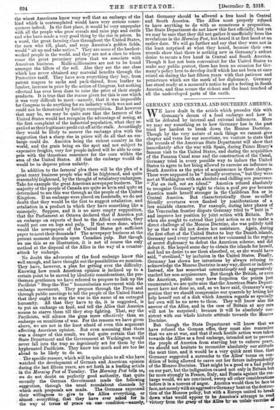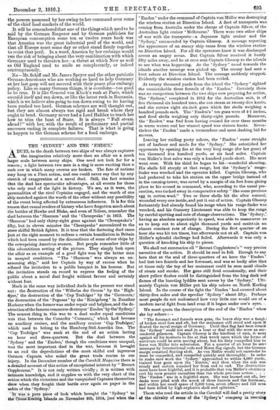GERMANY AND CENTRAL AND SOUTHERN AMERICA.
have dealt in the article which precedes this with Germany's dream of a food embargo and how it will be defeated by internal and external influences. Here we may say something as to how Germany has in the past tried her hardest to break down the Monroe Doctrine.
Though by the very nature of such things we cannot give chapter and verse for our assertions, we venture to state that the records of the American State Department will show that immediately after the war with Spain, during Prince Henry's famous visit to the United States, and during the acquisition of the Panama Canal zone and the construction of the Canal, 'Germany tried in every possible way to induce the -United States to agree to her being allowed to exercise an influence in South America as the price of acquiescence in these changes. These were supposed to be " friendly overtures,' but they were met at Washington with an absolute and chilling non possumus. 4` Not an inch, not an island." America refused ab,solutety to recognize Germany's right to claim a quid pro quo-because America made herself stronger in 'the Caribbean Sea or in Central America. But characteristically these so-called friendly overtures were flanked by manifestations of a less amiable character. For example, during later phases of the Venezuelan frontier dispute Germany tried to "butt in' and improve her position by joint action with Britain. But when she sought to extend that joint action so as to make a direct challenge of the Monroe Doctrine, she was politely: told • by us 'that we did not desire her assistance. Again, during the first effort of the United States to buy the Danish islands, Germany used every instrument at her command in the region of secret diplomacy to defeat the American scheme, and did defeat it. She hoped some day to obtain the islands for herself, and had no desire to see them absorbed, or, as she would have said, " sterilized," by inclusion in the United States. Finally, German_y has shown her intentions by always refusing to acknowledge the Monroe Doctrine in any way, direct or indirect. Instead,' she has somewhat ostentatiously and aggressively marked her non-acquiescence. But though the British, or even the American, public -may have forgotten the points just enumerated, we are• quite sure that the-American State Depart- ment have not done so, and, as we have said, Germany's -sug- gestion that we should compromise our quarrels by letting her help herself out of a dish which America regards as specially her own will be no news to them. They will know also the answer of the Allies, and in the case of Britain at any rate will not be surprised; because it will be absolutely con- sistent with our whole historic attitude towards the Monroe Doctrine.
But though the State Department will know- that we have refused the German offer, they must also remember that we are at war, and that if such hostile action were taken towards the Allies as a food embargo, intended not to prevent the people of America from starving but to enforce pesee, we should not hesitate to reconsider absolutely our attitude the nest time, and it would be a very quick next time, that Germany suggested a surrender to the Allies' terms on con- dition of being allowed to carve out her future independently of the Monroe. Doctrine. That might be a good or a bad policy on our part, but the indignation caused not only in Britain but far more strongly in France, Italy, and Russia against the em- bargo would, we are convinced, sweeR all other considerations before it in a torrent of anger. America would then be face to face, not merely with an aggressive Germany bent on the destruc- tion of the Monroe policy, but with a Europe united to break down what would appear to be America's attempt to rend `victory from the grasp of the -Allies by an unfair exercise of the powers possessed by her owing. toiler command over some of the chief food markets of the world.
It will be remembered that one of the things which used to be said by the German Emperor and by German publicists for European consumption some ten or twelve years back was that America was the great industrial peril of the world, and that all Europe must some day or other stand firmly together to resist that peril. In a word, America by her embargo would an the risk of bringing about the very combination with which Germany used to threaten her—a threat at which New as well as Old England used to smile so complacently, or indeed contemptuously.
No—Mr. Schiff and. Mr. James Speyer and the other patriotic German-Americans who are working so hard to help Germany at her last gasp will not succeed with their peace plus embargo policy. Like so many German things, it is overdone--too good to be true. It is like General von Kluck's rush at Paris, which overdid itself and ran down, or like the latest rush in Rumania. which is we believe also going to run down owing to its having been pushed too hard. German schemes are well thought out, but they are almost always too rigid and break where they ought to bend. Germany never had a Lord Halifax to teach her how to trim the boat of State. It is always " Full steam ahead 1" with her, with • the result of preliminary and partial successes ending in complete failures. That is what is going to -happen to the German scheme for a food embargo.













































 Previous page
Previous page